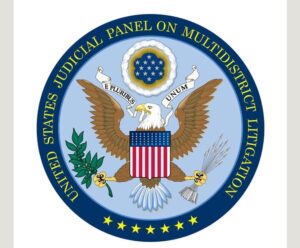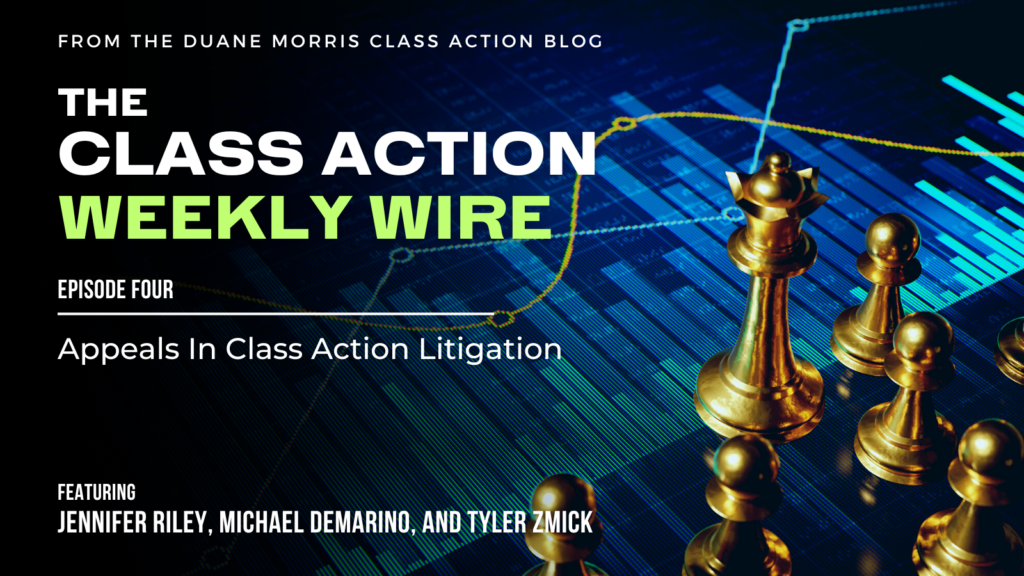 By Gerald L. Maatman, Jr., Gregory S. Slotnick, and James Hearon
By Gerald L. Maatman, Jr., Gregory S. Slotnick, and James Hearon
Duane Morris Takeaways: On July 10, 2024, in William Pace v. Hamilton Cove, A-4-23 (July 10, 2024 N.J.), the New Jersey Supreme Court held that consumer contract provisions waiving class actions are lawful under New Jersey law, even if they are not directly connected to an arbitration agreement. The Supreme Court also found that while class action waivers in consumer contracts are not per se contrary to public policy, they may be unenforceable if they are found to be unconscionable or otherwise violate state contract law. In a unanimous opinion, the Supreme Court analyzed claims by plaintiff-tenants seeking class certification in an action brought against their landlord, Hamilton Cove, for allegedly advertising that its apartments had “elevated, 24/7 security,” when in reality security cameras in the three-tower apartment complex did not function and there was no around-the-clock security. The Supreme Court reversed the New Jersey Appellate Division, finding that in the case before it, the plaintiff-tenants clearly and unambiguously waived their right to maintain a class action knowingly and voluntarily by signing a lease agreement including a standalone class action waiver, despite the fact that the class action waiver was not part of an arbitration agreement or arbitration provision.
The Supreme Court held that class action waivers standing alone and apart from a mandatory arbitration provision are not per se unenforceable. It then analyzed the lease language at issue and held that the lease was written in a simple, clear, understandable, and easily readable way as required by the New Jersey Consumer Fraud Act (CFA), putting plaintiff-tenants on notice that they could only proceed with a lawsuit against the landlord defendants on an individual basis. Under the lease and facts of the case, the Supreme Court held that the landlord defendants’ standalone class action waiver provision was lawful, relying on factors including the parties’ relative bargaining power, no indicia of economic compulsion, and the class action waiver not impermissibly prohibiting plaintiff-tenants from individually vindicating their statutory rights under the CFA. As such, the class action waiver was not unconscionable, and the lease was therefore enforceable.
The opinion will likely have a far-reaching impact for businesses using arbitration programs in New Jersey and beyond.
Case Background
The landlord defendants operate Hamilton Cove, a three-building apartment complex located in Weehawken, New Jersey housing hundreds of apartments along the Hudson River waterfront. Id. at 4-5. The plaintiff-tenants claimed that in April 2020, Hamilton Cove advertised on its website and on social media that its apartments had “elevated, 24/7 security,” and that during an apartment tour before moving in, Hamilton Cove’s leasing officer told them that security personnel would be stationed 24 hours a day, 7 days a week. Id. at 5. The plaintiff-tenants entered into lease agreements in 2020, which allowed prospective tenants three days to consult with an attorney, after which the releases would become final. Id. The leases included multiple addenda – one of which was a “Class Action Waiver” addendum – which were all incorporate into the lease. Id. at 5-6. The Class Action Waiver included language in bold and the plaintiff-tenants agreed to waive their ability to participate either as a class representative or members of any class action claims against the landlord-defendants. Id. at 6.
After moving into their apartments, the plaintiff-tenants found that the Hamilton Cove security cameras did not work, and there was no 24/7 security. They claimed that the advertised “24/7 security” drew them to lease their apartments and pay the leasehold price, especially due to their allegation that Weehawken has a property crime rate approximately one-third higher than New Jersey’s state average. Id. at 7.
On March 31, 2022, the plaintiff-tenants filed the Complaint, claiming common law fraud and violation of the CFA. Id. They specifically alleged that the landlord-defendants engaged in an “unconscionable commercial practice” of knowingly making false representations regarding 24/7 security on their premises, and they sought to certify a class comprised of similarly-situated tenants. Id. at 7-8.
After landlord-defendants moved to dismiss the Complaint for failure to state a claim or, alternatively, to strike plaintiffs’ class allegations – arguing that plaintiff-tenants waived their ability to proceed as a class when they signed the class action waivers – the trial court denied the motions. Id. at 8. After landlord-defendants appealed the decision, the Appellate Division affirmed the trial court’s denial, holding that “a class action waiver in a contract that does not contain a mandatory arbitration provision” is unenforceable as a matter of law and public policy. Id. at 8-9. The New Jersey Appellate Division found that unless rendered unenforceable by the presence of an arbitration agreement, class action waivers are clearly contrary to the public policy of New Jersey, regardless of whether they are unconscionable or part of an adhesion contract. Id. at 10.
The New Jersey Supreme Court’s Decision
The New Jersey Supreme Court began by analyzing class actions as a procedural device and the legal requirements necessary to certify a class action. Id. at 16-17. While acknowledging that class action requirements should be “liberally construed” (id. at 18), the Supreme Court disagreed with the Appellate Division’s establishment of a bright-line rule that a waiver of the right to maintain a class action in unenforceable absent a mandatory arbitration agreement. Id. at 19. The Supreme Court held that an arbitration provision is not necessary and is separate to a class waiver’s enforceability, and that New Jersey law supports the contractual waiver of many rights that advance important goals, such as the right to a jury trial, provided that the requisite procedural safeguards surrounding the waiver are met. Id. at 19-20. The Supreme Court reiterated New Jersey’s strong public policy favoring the freedom to contract, and noted that legislatures can override this freedom in specific settings – which has not occurred in the context of class action waivers. It stated that in New Jersey, there is neither a controlling statutory provision expressly permitting class actions, nor a clear statement of public policy disfavoring class action waivers – as such, class action waivers must be evaluated through the lens of unconscionability and traditional tenants of contract formation. Id. at 23-24. As a result, the Supreme Court held that class action waivers standing alone and apart from a mandatory arbitration provision are not per se unenforceable, but that particular waivers may be unenforceable if unconscionable or invalid under general contract principles. Id. at 24. It then considered the specific waiver in the case before it. Id.
The Supreme Court confirmed that in order to analyze whether the class action waiver in the Hamilton Cove lease signed by plaintiff-tenants was unconscionable, a fact-sensitive analysis was required. Id. at 25. Factors considered by the Supreme Court to determine whether the class waiver was an unenforceable contract of adhesion, known as the Rudbart factors, included: (1) the subject matter of the contract; (2) the parties’ relative bargaining power; (3) the degree of economic compulsion motivating the adhering party; and (4) the public interests affected by the contract. Id. at 25-26. The Supreme Court found that plaintiff-tenants knowingly and voluntarily waived their right to maintain a class action because the waiver language was written in a simple, clear, understandable and easily readable way as required by the CFA, and it clearly and unambiguously put plaintiff-tenants on notice that they could only proceed with a lawsuit against landlord-defendants on an individual basis. Id. at 30.
The Supreme Court found that even if the lease could be considered a contract of adhesion, the Rudbart factors favored enforceability, since the parties’ relative bargaining power did not favor either party and plaintiff-tenants had time to consult with an attorney and were free to seek alternative housing if they did not agree with the lease’s terms. Id. at 30-31. It held that plaintiff-tenants were not under economic compulsion, and likely had the ability to choose from a vast selection of apartments available for a monthly rent comparable to the $3,700 rent at issue here. Id. at 31-32. Finally, the Supreme Court found that plaintiff-tenants were still able to pursue their CFA claims on an individual basis against the landlord-defendants, and that the class waiver did not prohibit plaintiffs, or similarly-situated Hamilton Cove tenants, from individually vindicating their statutory rights under the CFA. Id. at 33. Thus, the Supreme Court held that the class waiver was not unconscionable and was enforceable, reversing the Appellate Division’s judgment. Id. at 34.
Implications For New Jersey Businesses And Employers
The New Jersey Supreme Court’s opinion seemingly exceeds the landlord-tenant relationship, and may be characterized as a victory for New Jersey employers. As a result of the ruling, New Jersey businesses may seek to enforce a valid class action waiver separate and apart from an arbitration agreement or arbitration provision. While the class action waiver itself must be presented in a clear and direct manner, these waivers are not per se unenforceable on their face. As a best practice in light of the decision, New Jersey employers and businesses alike should ensure that any class action waivers provide for a reasonable period of time for review, and should strongly consider adding language providing time for a prospective signee to have the language reviewed by an attorney prior to signing. However, New Jersey businesses that do not wish to include mandatory arbitration provisions in contracts now have a clear path to still including class action waivers in such contracts, which are not per se unlawful, but which must still be presented in a manner that is not unconscionable based on individual circumstances.








